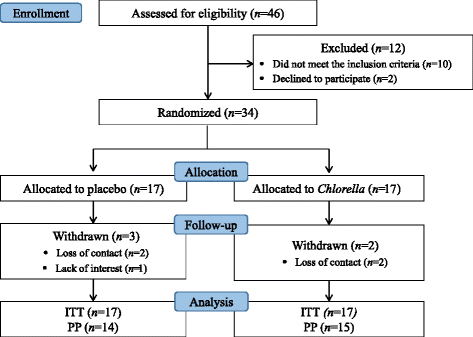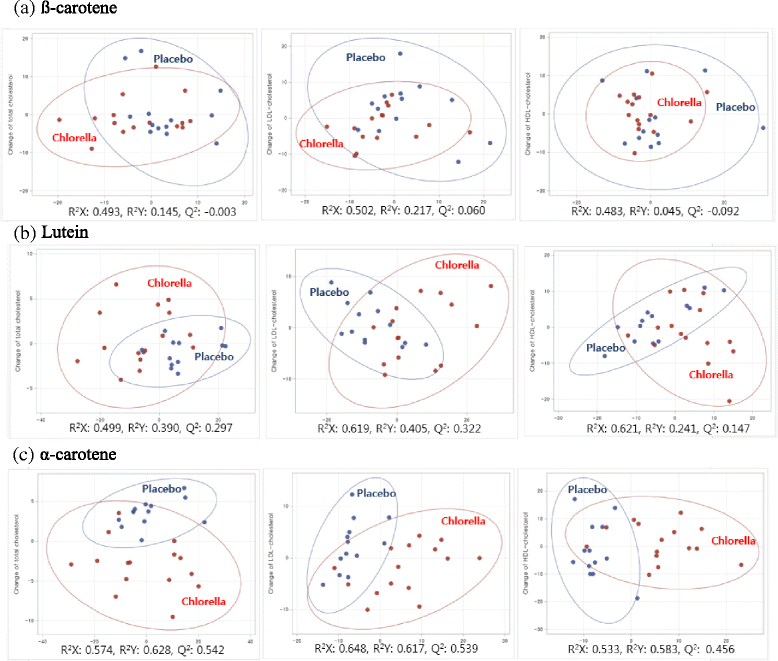A dietary cholesterol challenge study to assess Chlorella supplementation in maintaining healthy lipid levels in adults: a double-blinded, randomized, placebo-controlled study
- PMID: 27177615
- PMCID: PMC4866071
- DOI: 10.1186/s12937-016-0174-9
A dietary cholesterol challenge study to assess Chlorella supplementation in maintaining healthy lipid levels in adults: a double-blinded, randomized, placebo-controlled study
Abstract
Background: Previous animal studies suggested that Chlorella, a unicellular green alga, has a preventive role in maintaining serum cholesterol levels against excess dietary cholesterol intake. This study aimed to conduct a pioneering investigation to clarify this issue in healthy subjects by adopting a dietary cholesterol challenge, which has not been used previously in similar studies of Chlorella in hypercholesterolemia.
Methods: In this double blind, randomized, placebo-controlled study, 34 participants ingested 510 mg of dietary cholesterol from three eggs concomitantly with a usual dose of Chlorella (5 g/d) or a matched placebo for 4 weeks.
Results: The dietary cholesterol challenge induced consistently higher concentrations of serum total cholesterol (TC, P < 0.001), LDL-C (P = 0.004), and HDL-C (P = 0.010) compared with baseline values, suggesting that the challenge was reliable. Thus, we observed a preventive action of Chlorella in maintaining serum TC versus placebo levels (3.5 % versus 9.8 %, respectively; P = 0.037) and LDL-C versus placebo levels (1.7 % versus 14.3 %, respectively; P = 0.012) against excessive dietary cholesterol intake and in augmenting HDL-C versus placebo levels (8.3 % versus 3.8 %, respectively). Furthermore, serum α-carotene showed the best separation between the placebo and Chlorella groups (R(2)X and R(2)Y > 0.5; Q(2) > 0.4).
Conclusion: The results suggest that a fully replicated dietary cholesterol challenge may be useful in assessing the effectiveness of dietary supplements in maintaining the serum lipid profiles of adults whose habitual diets are high in cholesterol.
Trial registration: WHO International Clinical Trials Registry Platform ( KCT0000258 ).
Keywords: Carotenoids; Chlorella; Dietary cholesterol challenge; Healthy adult.
Figures


Similar articles
-
Impact of daily Chlorella consumption on serum lipid and carotenoid profiles in mildly hypercholesterolemic adults: a double-blinded, randomized, placebo-controlled study.Nutr J. 2014 Jun 11;13:57. doi: 10.1186/1475-2891-13-57. Nutr J. 2014. PMID: 24920270 Free PMC article. Clinical Trial.
-
A double-blind, randomized, controlled trial of the effects of two eggs per day in moderately hypercholesterolemic and combined hyperlipidemic subjects taught the NCEP step I diet.J Am Coll Nutr. 1997 Dec;16(6):551-61. J Am Coll Nutr. 1997. PMID: 9430083 Clinical Trial.
-
Randomized double blind clinical trial on the effect of oral α-cyclodextrin on serum lipids.Lipids Health Dis. 2016 Jul 12;15(1):115. doi: 10.1186/s12944-016-0284-6. Lipids Health Dis. 2016. PMID: 27405337 Free PMC article. Clinical Trial.
-
Dietary Cholesterol, Serum Lipids, and Heart Disease: Are Eggs Working for or Against You?Nutrients. 2018 Mar 29;10(4):426. doi: 10.3390/nu10040426. Nutrients. 2018. PMID: 29596318 Free PMC article. Review.
-
Update of the Impact of Consumption of Whole Chicken Eggs on the Lipid Profile: to What Extent are They Impacting?Arq Bras Cardiol. 2018 Jun;110(6):585-587. doi: 10.5935/abc.20180092. Arq Bras Cardiol. 2018. PMID: 30226918 Free PMC article. Review. No abstract available.
Cited by
-
The Role of Chlorella and Spirulina as Adjuvants of Cardiovascular Risk Factor Control: A Systematic Review and Meta-Analysis of Randomised Controlled Trials.Nutrients. 2025 Mar 7;17(6):943. doi: 10.3390/nu17060943. Nutrients. 2025. PMID: 40289965 Free PMC article.
-
Potential of Chlorella as a Dietary Supplement to Promote Human Health.Nutrients. 2020 Aug 20;12(9):2524. doi: 10.3390/nu12092524. Nutrients. 2020. PMID: 32825362 Free PMC article. Review.
-
A Single Dose of Marine Chlorella vulgaris Increases Plasma Concentrations of Lutein, β-Carotene and Zeaxanthin in Healthy Male Volunteers.Antioxidants (Basel). 2021 Jul 22;10(8):1164. doi: 10.3390/antiox10081164. Antioxidants (Basel). 2021. PMID: 34439412 Free PMC article.
-
Emerging Technologies in Algal Biotechnology: Toward the Establishment of a Sustainable, Algae-Based Bioeconomy.Front Plant Sci. 2020 Mar 17;11:279. doi: 10.3389/fpls.2020.00279. eCollection 2020. Front Plant Sci. 2020. PMID: 32256509 Free PMC article. Review.
-
Impact of Regular Intake of Microalgae on Nutrient Supply and Cardiovascular Risk Factors: Results from the NovAL Intervention Study.Nutrients. 2023 Mar 28;15(7):1645. doi: 10.3390/nu15071645. Nutrients. 2023. PMID: 37049486 Free PMC article. Clinical Trial.
References
-
- Wu T, Trevisan M, Genco RJ, Falkner KL, Dorn JP, Sempos CT. Examination of the relation between periodontal health status and cardiovascular risk factors: serum total and high density lipoprotein cholesterol, C-reactive protein, and plasma fibrinogen. Am J Epidemiol. 2000;151:273–82. doi: 10.1093/oxfordjournals.aje.a010203. - DOI - PubMed
-
- The Lipid Research Clinics Coronary Primary Prevention Trial results. II. The relationship of reduction in incidence of coronary heart disease to cholesterol lowering. JAMA 1984; 251:365-374. - PubMed
-
- Alvarez-Suarez JM, Giampieri F, Tulipani S, Casoli T, Di Stefano G, Gonzalez-Paramas AM, Santos-Buelga C, Busco F, Quiles JL, Cordero MD, et al. One-month strawberry-rich anthocyanin supplementation ameliorates cardiovascular risk, oxidative stress markers and platelet activation in humans. J Nutr Biochem. 2014;25:289–94. doi: 10.1016/j.jnutbio.2013.11.002. - DOI - PubMed
Publication types
MeSH terms
Substances
LinkOut - more resources
Full Text Sources
Other Literature Sources

